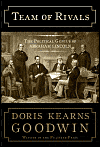Honest Abe and All That

I'm happy to say that we have a new contributor, Charles Huff. Charles is a friend of Jake's and has written a trenchant review of Doris Kearns Goodwin's Team of Rivals: The Political Genius of Abraham Lincoln. - RD
Doris Kearns Goodwin, a historian famed for her Pulitzer-prize winning No Ordinary Time, delivers a new biography of Abraham Lincoln. In contrast to some other recent Lincoln biographies, Goodwin treats her subject in a traditional fashion, focusing on Lincoln’s statesmanship rather than his sexuality or depression. Goodwin illuminates Lincoln’s genius by comparing his life to the lives of three of his contemporaries, who were the backbone of his first cabinet. William H. Seward, his Secretary of State, Salmon P. Chase, his Secretary of Treasury, and Edward Bates, his Attorney General, were all strong candidates for the Republican nomination the year Lincoln won. Goodwin argues that though brilliant, willful men surrounded Lincoln, he knew his own mind. His genius rests not in the fact that he surrounded himself with good men, but that his will was the rudder of his august and divided cabinet.
As Goodwin begins the intertwined tale of these four men, she advances with a style reminiscent of a John Grisham novel. Though we know Lincoln will win the nomination and head to the White House, the steps along the way are fraught with tension. When the four men finally converge at the White House at the start of the Civil War, Goodwin gets down to business. She defines the relationships between the men, confirms the foreshadowing of their temperaments, and displays the genius of Lincoln. From this point on, she focuses on Lincoln’s decisions during the war and his apt handling of his turbulent cabinet.
There are some drawbacks to Goodwin’s method. As she builds her case, she seems to repeat herself overmuch, sometimes using the same anecdote more than once. As she tries to prove Lincoln’s genius, she sometimes seems unfair to the people around him. She is kind to those that support him, and caustic to those who do not.
Overall Goodwin’s work is worth reading. She accomplishes her goal. She shows the honesty and shrewdness that led the anecdotal prairie lawyer to firmness of decision and a superior knowledge of men and the times. Goodwin’s love of Lincoln is infectious, and while she handles her characters in light of her reverence for Lincoln, she does not make them straw men. She makes one appreciate the genius of Seward and Stanton as well as Lincoln. I highly recommend the book.
- Charles Huff


2 Comments:
I appreciated your review and your interest in American history, particularly Doris Kearns-Goodwin (sic). Although her writing on the Roosevelt's was excellent, her first foray into narrative (vs. Johnson and Kennedy), I sometimes wonder if her book on Lincoln is really that great. I get the sense that she simply applied the same method and foisted some of her narrative into her previous mold--that she's she's riding off her laurels and still recovering from her earlier imbroglio
She does however offer one salient point: cloistering yourself with a claque is no recipe for a successful presidency. Reading last weeks Newsweek made this point even more germane.
I have two questions. She repeatedly asserts that when Linclon told a story he would do it in an engrossing, even excited manner, which she attempts to subtly use to validate her story telling. Do you think then that she captures Linclon's storytelling technique better than his vision to save the Union (vis-a-vis saving the slaves). Or to put it differently, how does she define the earmark of Lincoln: his passion or his fidelity. To me, she seems to waffle, often suggesting that each were symbotic--but is she right?
Secondly, do you think McCullough does a better job with narrative/reconstructing history. (I think he is far superior :)).
[quote] I get the sense that she simply applied the same method and foisted some of her narrative into her previous mold--that she's she's riding off her laurels and still recovering from her earlier imbroglio [/quote]
You're probably right about that. I haven't read her earlier works, but she did seem to meander and repeat herself, so your comment doesn't surprise me.
[quote] Or to put it differently, how does she define the earmark of Lincoln: his passion or his fidelity. To me, she seems to waffle, often suggesting that each were symbotic--but is she right? [/quote].
I think she finds integrity the driving force and story-telling his master method. She captures the first best, perhaps because she exaggerates the importance of his story telling for the reasons you suggested.
[quote]
Secondly, do you think McCullough does a better job with narrative/reconstructing history. (I think he is far superior :)). [/quote]
Yes, absolutely.
Post a Comment
<< Home